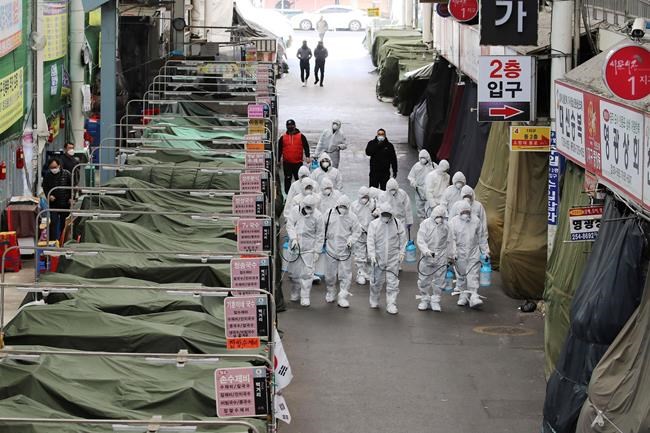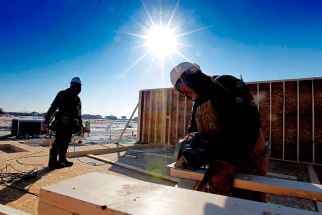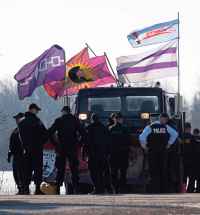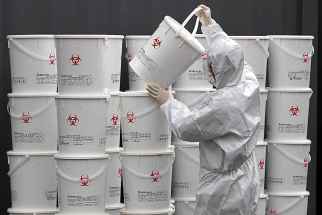Uncertainty rises as virus outbreaks spread
Read this article for free:
or
Already have an account? Log in here »
To continue reading, please subscribe:
Monthly Digital Subscription
$0 for the first 4 weeks*
- Enjoy unlimited reading on winnipegfreepress.com
- Read the E-Edition, our digital replica newspaper
- Access News Break, our award-winning app
- Play interactive puzzles
*No charge for 4 weeks then price increases to the regular rate of $19.00 plus GST every four weeks. Offer available to new and qualified returning subscribers only. Cancel any time.
Monthly Digital Subscription
$4.75/week*
- Enjoy unlimited reading on winnipegfreepress.com
- Read the E-Edition, our digital replica newspaper
- Access News Break, our award-winning app
- Play interactive puzzles
*Billed as $19 plus GST every four weeks. Cancel any time.
To continue reading, please subscribe:
Add Free Press access to your Brandon Sun subscription for only an additional
$1 for the first 4 weeks*
*Your next subscription payment will increase by $1.00 and you will be charged $16.99 plus GST for four weeks. After four weeks, your payment will increase to $23.99 plus GST every four weeks.
Read unlimited articles for free today:
or
Already have an account? Log in here »
Hey there, time traveller!
This article was published 24/02/2020 (2121 days ago), so information in it may no longer be current.
The new Chinese coronavirus suddenly claimed clusters of victims in Italy, Iran and South Korea during the weekend. World stock markets were rattled on Monday by a feeling that this disease is on the move and is much more volatile than it previously seemed.
Canada has been handling the disease outbreak well so far. The latest flare-ups, however, should warn Canadian health authorities that their task may suddenly become more difficult.
In northern Italy, 219 cases of COVID-19 have been confirmed and seven people have died of the disease. Lodi and other towns in Italy’s Lombardy region were locked down after panicked shoppers emptied grocery-store shelves. South Korea has confirmed 760 cases, mainly connected to a single religious congregation. Iran has reported 12 deaths, but Iran has a history of covering up or understating bad news. Travellers from Iran have carried the virus to other countries in the Middle East.
In Hong Kong, thousands of people are under quarantine while doctors try to figure out how bad the outbreak is. Community spread has also been found in Singapore, Thailand, Taiwan and Vietnam, meaning people in those countries have been infected but no one knows how they caught the disease.
China is still bearing the main impact of the coronavirus that was first detected in Wuhan in December. The Chinese authorities severely restricted movement of people and banned public gatherings in the hope of stopping spread of the disease.
China announced Monday postponement of the scheduled March meeting in Beijing of the National People’s Congress. Travellers arriving in Beijing from other parts of the country are immediately placed in two-week quarantine these days. Under these circumstances, it is simply not possible to gather delegates from the provinces for a legislative gathering in Beijing.
Canadians have been getting off lightly up to now. A few plane loads of Canadians from Wuhan and from a virus-infected cruise ship at Yokohama have been repatriated into quarantine. A handful of other travellers from China have identified themselves. With such small number of potential carriers, the authorities could readily tell who needed to be tested and how they should be isolated.
Outbreaks outside China, however, suggest that numbers of cases can suddenly multiply, taxing the abilities of laboratories and hospitals that were never built or staffed to test and treat hundreds of patients who suddenly all need immediate attention.

The stock market was affected because people in infected cities — quarantined or confined to their homes — are neither producing nor consuming, neither buying nor selling. They may be perfectly healthy, but they are for the moment out of the economic picture. The companies that employ them or sell products to them must eventually feel the impact. If medical science had a vaccine or a cure for this disease, the economic impact would be less, but for the foreseeable future quarantine and lockdowns are likely to continue.
Canada should profit from the experience of countries that have suffered COVID-19 outbreaks. Every province should have people qualified to train health workers in the safe and effective treatment of COVID-19 patients. Authentic information about the disease and its spread should be promptly published because where information is lacking, rumour will soon fill the gap.
Monday’s stock market gyrations showed how touchy this subject is. Fear and its consequences may be kept to a minimum if the authorities seem to be meeting the challenges efficiently.




















